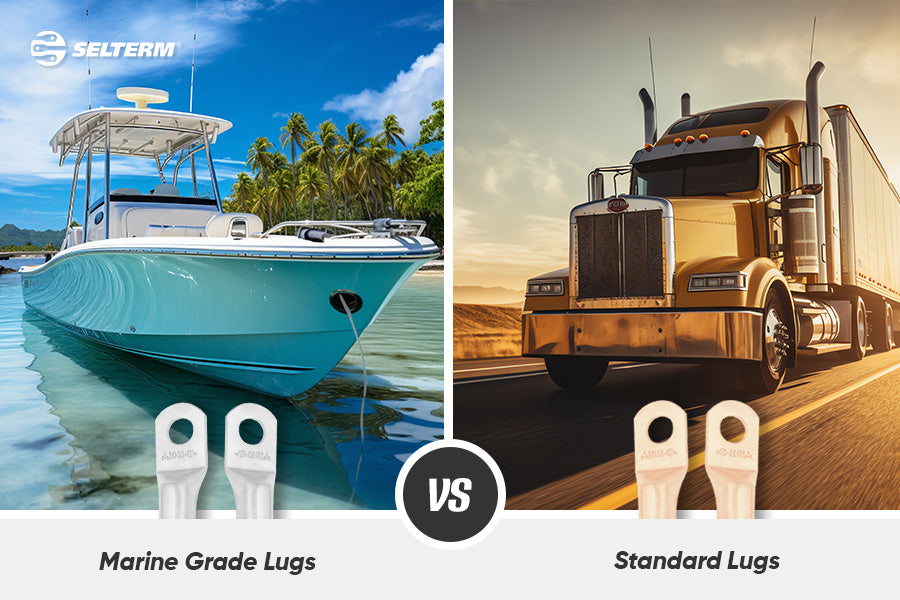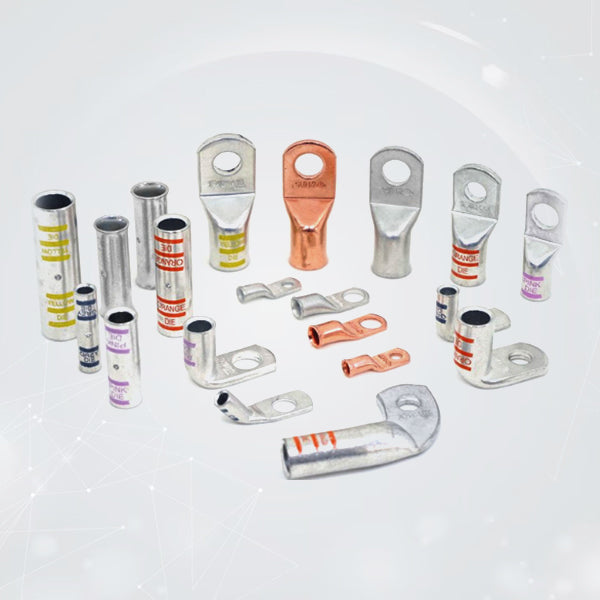
Marine Grade Lugs vs Standard Lugs: What’s the Real Difference?
If you're building or upgrading an electrical system—whether it's for a boat, RV, off-grid solar array, or automotive application—choosing the right lug for your cable connections is a make-or-break decision. And one of the most common questions is:
Should I use marine grade lugs or standard copper lugs?
At first glance, they might look similar. But when you dig into the details—especially material, performance in harsh environments, and long-term durability—the difference between standard and tinned copper cable lugs becomes crystal clear.
In this blog, we’ll break down exactly what sets marine grade lugs apart, when to use them, and why they’re the preferred choice for high-moisture and high-vibration environments.
What Are Standard Cable Lugs?
Standard cable lugs are most commonly made of bare copper and are used to connect power cables to terminals, batteries, distribution panels, or grounding points. They are designed to be crimped or soldered onto the end of a conductor for a secure electrical connection.
Key Traits of Standard Lugs:
✅ Made from high-conductivity copper for efficient energy transfer
✅ Compatible with a wide range of applications including automotive, industrial, and home backup systems
❌ More prone to oxidation and corrosion in damp or marine environments
❌ May require extra sealing with heat shrink or sealant to improve lifespan in harsh conditions
While bare copper lugs are reliable in dry, controlled environments, they can deteriorate quickly when exposed to moisture, salt air, and temperature fluctuations—exactly the conditions found on boats, coastal vehicles, and outdoor installations.
What Are Marine Grade Lugs?
Marine grade lugs are specifically engineered to withstand harsh, corrosive environments like those found in marine and coastal areas. Their defining characteristic? They're made from tinned copper—copper that has been electroplated with a thin layer of tin.
This tin coating dramatically improves the lug’s resistance to oxidation, corrosion, and electrolysis.
Core Features of Marine Grade Lugs:
- ✅ Made from tinned copper, offering enhanced corrosion resistance
- ✅ Ideal for use in boats, marinas, solar installations, and any high-moisture environment
- ✅ Maintains conductivity over time thanks to the protective outer layer
- ✅ Often used with heat shrink tubing for added water-tight sealing
- ✅ Help meet marine electrical standards like ABYC and USCG guidelines
In short, marine grade lugs are the gold standard for durability, especially in demanding outdoor or marine electrical systems.
Tinned Copper vs Bare Copper: What's the Real Difference?
Let’s break it down further. Here’s a side-by-side comparison:
|
Feature |
Standard Copper Lugs |
Marine Grade (Tinned Copper Lugs) |
|
Material |
Bare copper |
Copper with tin plating |
|
Corrosion Resistance |
Low – prone to oxidation |
High – tin coating prevents corrosion |
|
Ideal Environments |
Dry, temperature-controlled |
High-humidity, coastal, outdoor, marine |
|
Durability Over Time |
May degrade in moisture |
Long-lasting even in saltwater |
|
Maintenance Required |
May need sealants or replacements |
Minimal upkeep when installed properly |
Why Tinned Copper Lugs Are the Smart Choice for Marine and Outdoor Use
When moisture gets into an electrical system, the first thing to corrode is often the lug. That corrosion leads to poor conductivity, increased resistance, heat buildup—and eventually failure.
By using cable lug tinned copper versions, you're protecting your connection point from the elements, extending the life of your entire system, and avoiding costly rework.
Whether you're powering a trolling motor, running bilge pumps, or installing batteries in an off-grid cabin, tinned copper lugs make sure your connections hold strong.
When Should You Use Marine Grade Lugs?
You should strongly consider marine-grade lugs if you’re working on:
- 🛥 Boats & Watercraft – Essential for everything from navigation lights to starter motors
- ☀️ Outdoor Solar Systems – Especially in humid or rainy climates
- 🛻 Coastal RVs & Overlanding Vehicles – Where salt air can creep into electrical systems
- 🔌 Backup Power in Outdoor Sheds/Garages – Moisture and temperature swings increase corrosion risk
- 🚢 Commercial Marine Applications – Required to meet USCG or ABYC electrical codes
Pro tip: Pair tinned copper lugs with adhesive-lined heat shrink tubing for a watertight, vibration-proof seal.
SELTERM Tinned Copper Lugs: Built to Last in Harsh Environments
Looking for marine grade lugs that are trusted by pros in the field?
Check out the SELTERM collection of tinned copper battery cable lugs—designed for maximum conductivity, corrosion resistance, and long-term performance.
✅ UL Listed & RoHS Compliant
✅ 100% Oxygen-Free Copper with Electro-Tin Plating
✅ Available in a variety of wire gauges and stud hole sizes
✅ Ideal for boats, RVs, solar, and industrial applications
✅ Easy to crimp, solder, and heat shrink
🔗 Explore SELTERM Tinned Copper Lugs
Tips for Installing Marine Grade Lugs
To get the most out of your tinned copper lugs, follow these best practices:
-
Strip Cable Properly
Remove insulation just enough to fully seat the conductor in the lug barrel—don’t overstrip. -
Crimp with a Proper Tool
Use a heavy-duty hex or indent crimper sized for your wire gauge. -
Use Heat Shrink with Adhesive
This seals out water and adds mechanical strength to the connection. -
Torque Fasteners Correctly
Over-tightening can deform the lug, while under-tightening causes weak electrical contact. -
Inspect Regularly in Harsh Environments
Even with marine-grade components, periodic checks are smart—especially in salt-heavy conditions.
Final Thoughts
Choosing between standard and marine grade lugs comes down to one thing: environment. If your application will see moisture, salt air, or temperature extremes, there’s no contest—tinned copper cable lugs are the better investment.
They’re not just for boats—they're ideal for RVs, solar, outdoor backup systems, and anywhere reliability is critical. Think long-term. Think corrosion resistance. Think SELTERM marine-grade lugs.
Ready to Upgrade Your System’s Durability?
👉 Shop SELTERM Tinned Copper Battery Cable Lugs





